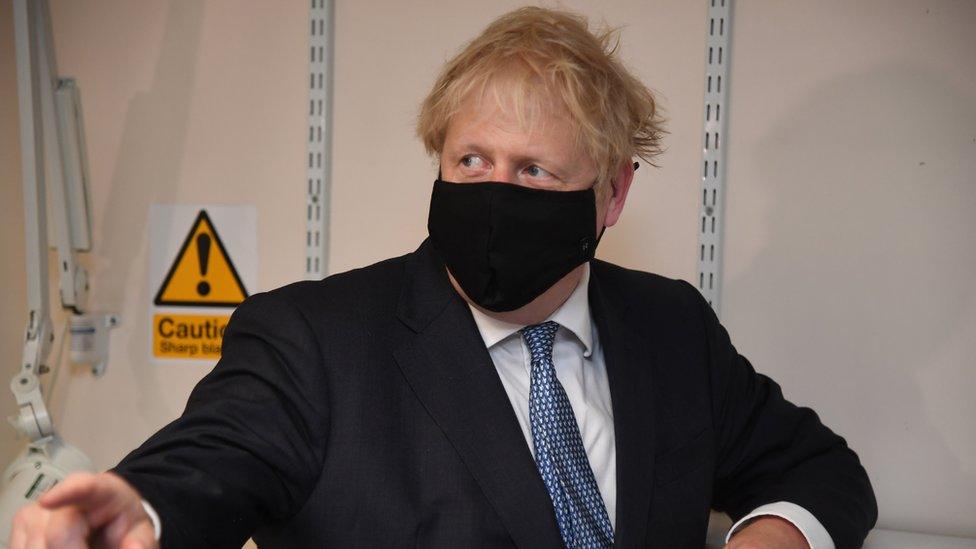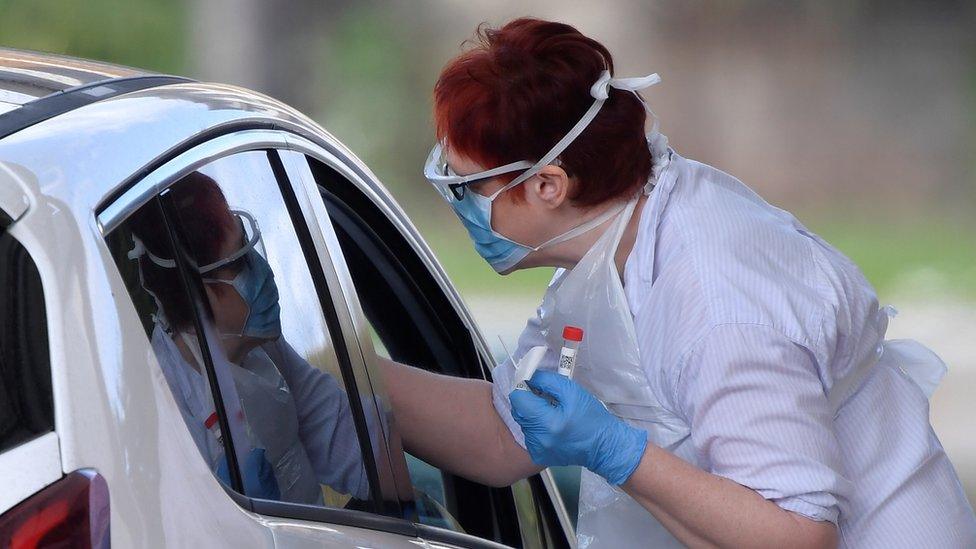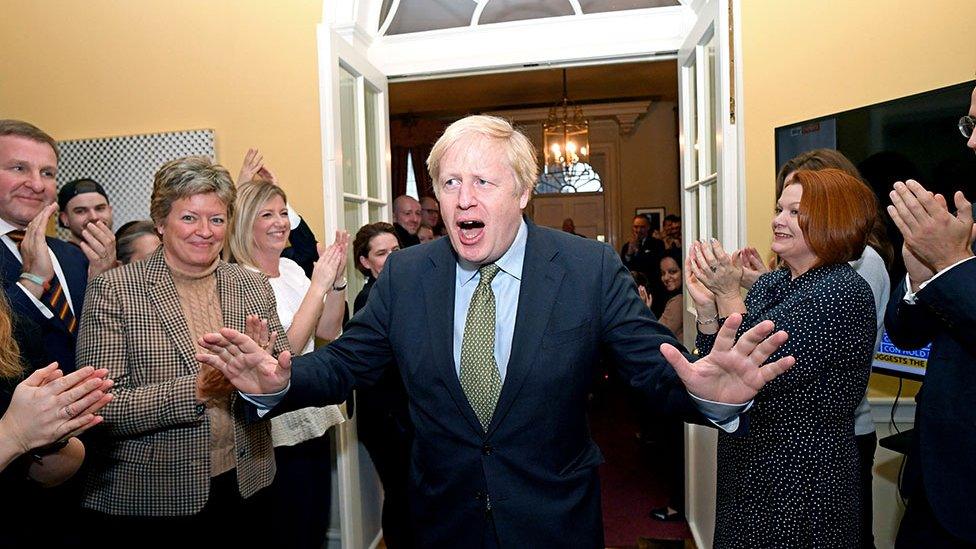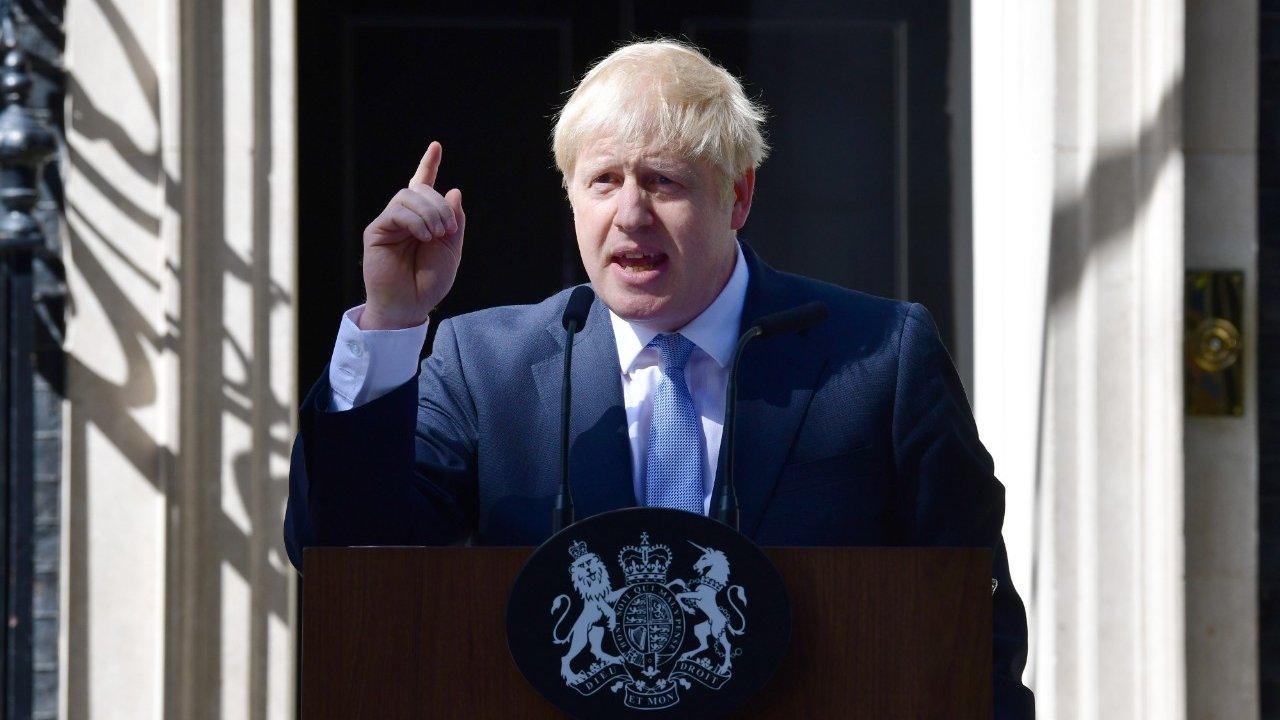Boris Johnson changes tone over handling of pandemic
- Published

Boris Johnson doesn't tend to do remorse.
He is fond of looking on the bright side and moving forward. "Come on! Come on!" and "Fantastic, fantastic!" are the phrases you hear in public most frequently from his mouth.
Even some of his allies agree privately with his detractors that he is a politician for the good times, a spreader of cheer, rather than seeming like a statesman for a crisis.
That's one reason why the handling of this terrible epidemic has been a profound political challenge for this prime minister, beyond the enormous strain that coronavirus has put on the government machine and his own health.
He moved into No 10 a year ago today, taking charge of a country politically divided over Brexit, with protestors at the gate.
But after chucking veteran Tories out of the parliamentary party and suspending Parliament, the first tumultuous phase of his premiership ended with him being clapped back into No 10 for the second time, and with a thumping majority.
A pugilistic Downing Street was almost punch drunk with the opportunities that lay before them.
But with unbelievable timing, 31 January 2020 - Brexit day - was also the day that the UK confirmed its first cases of coronavirus.
Far from the first day of Boris Johnson's dream of raw power, it was the first day of a nightmare for the country's health and economy too.
It is the pandemic, therefore, not his hoped-for policies, that have fundamentally shaped Boris Johnson's premiership so far.
In full: Laura Kuenssberg speaks to Boris Johnson
Like other world leaders, he had to take a series of enormous decisions, at huge speed, that have had consequences for each and every one of us.
The worst of the health crisis has faded; however, Boris Johnson has shown a profound reluctance to admit mistakes that were made.
The government did expand the capacity of the health service at breakneck speed. The Treasury's interventions in the economy have kept millions of people afloat for now.
UK scientists are ahead in the world in terms of treatments and vaccine research. But a debate has raged about whether the lockdown came too late.
Stock response
Why was the government slow to ramp up the testing they now say is vital? Why were protections for care homes not introduced much sooner? Why has the death rate here been so much higher than in nearly every other country?
Why does the government keep promising 'world beating' this, and 'world beating' that, when the UK's record on handling the pandemic has many flaws?
When these questions have come, the prime minister's stock response has been to protest that it is not the right time to look at what went wrong.
Time and again, ministers have repeated the mantra that "we made the right decisions at the right time".
But today, as he reflected on his 366 days in power, Boris Johnson inched towards confronting what went wrong.

Ministers have faced criticism over their initial decision to abandon mass community testing.
In his first full TV interview since the lockdown, and his own time in hospital, he told me that ministers had not understood the disease "for the first few weeks and months", unaware that the virus was already here and in circulation before the government fully realised.
And what of the timing of the lockdown?
Again, he took a step towards acknowledging that there could have been mistakes, suggesting the lockdown timing was an "open question", and that while the government had stuck "like glue" to the advice given by its scientists, maybe that advice had been wrong.
Preaching, not practice
Despite that change in tone, the prime minister's reluctance to go into detail yet about the mistakes the government might have made is still striking.
Advice from his former close adviser Will Walden, who spoke to us on Newscast, is that he should admit mistakes were made, and get on with a proper inquiry into what went wrong, seems to have fallen largely on deaf ears.
While the prime minister always says that he takes full responsibility for what the government does, that's perhaps preaching, not practice.
Mr Johnson wants to use the government's experience of what happened during the pandemic to speed up his agenda, to "double down on levelling up", as he puts it in his peculiar political jargon.
In other words, to push ahead with more determination, and less fudge in Whitehall, with the changes that he says will actually improve the lives of voters, particularly those who voted Tory for the first time in 2019.
Questions continue
While preparing the NHS for a potential second surge, he clearly wants to concentrate on what's next, not what's gone before.
But perhaps until the government is really ready to acknowledge what has happened, the questions will continue - and the public may still feel anxious about whether they can really trust ministers to handle a second surge next time round.
Just as 366 days ago, optimism is Boris Johnson's trademark.
But if the last few months have shown anything, it is that the real challenge of life in power, is that events that can surprise.
- Published24 July 2020

- Published24 July 2020

